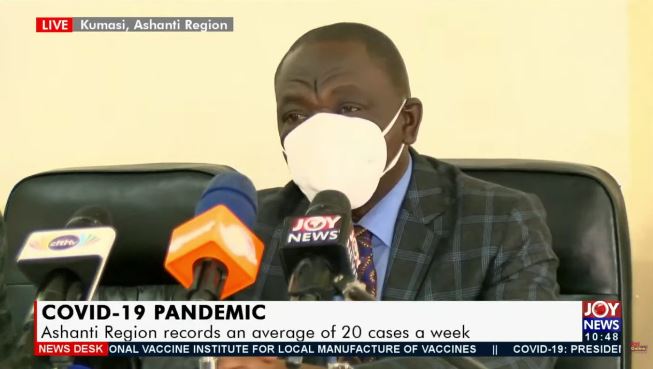The Ashanti Regional Health Directorate has begun the administration of Covid-19 vaccines to pregnant women.
Immune booster shots have also been introduced to curtail the spread and harmful effects of Covid-19 on pregnant women and the general public.
The initial roll-out of Covid-19 vaccines in Ghana excluded pregnant women, which health experts say was premised on skepticism.
However, recent local and international findings have confirmed the vaccines are safe to be administered to pregnant women.
Speaking at a press conference, Ashanti Regional Director of the Ghana Health Service, Dr. Emmanuel Tinkorang, allayed fears associated with pregnant women being vaccinated and encouraged expectant mothers to visit various centres for their jab.
“Now, evidence has shown that we can immunize pregnant women because when they are pregnant their immunity is quite low. Therefore, if we have the privilege to immunize pregnant women, it is better.
From scientific findings, it has been shown that the vaccines are safe for pregnant women. So nobody should think of abortion and miscarriage resulting from the vaccination. It may be coincidental; you may take the vaccine and abortion happens spontaneously," he said.
“Do not associate this with the vaccines,” he added.
Assuring the safety of the vaccines, Dr. Tinkorang said expectant mothers can receive either the Pfitzer or the Moderna vaccines.
“Since the vaccines are safe, we are recommending Moderna and Pfitzer for pregnant women. The first dose will be given as early as possible in pregnancy and the second dose will follow that of the general population.”.
Dr. Tinkorang indicated that the health directorate has initiated a booster policy for persons who have completed their primary vaccination 3 to 6 months ago.
The targeted category includes persons with underlying health issues, health workers, persons aged 60 year and above, security personnel, and members of the various arms of government.
“We know that immunity for Covid-19 wanes, so when you take the vaccines 3 to 6 months, the immunity drops. For that reason, the high-risk groups will be receiving their booster shots. The booster dose will be given 3 to 6 months after the second dose,” he added.
Active cases of Covid-19 in the Ashanti region now stands at 61, with 54 of those being managed at home and the remaining, at various treatment centres.
Latest Stories
-
‘Start Right’ fair expands to empower Northern SHS students with broader career choices
10 minutes -
Defence Minister announces plans for improved housing for Ghana Armed Forces personnel
20 minutes -
Escape to Asia with aKorfa: Two Joy FM listeners head to final round
26 minutes -
Steel bender jailed for machete attack over girlfriend dispute
30 minutes -
If Iran and Israel do stop firing, Trump’s high-risk strikes may pay off
32 minutes -
Nationwide rollout of free HPV vaccine for girls begins in September – GHS
35 minutes -
China’s partnership with Africa represents fundamental shift from exploitation – ACUC
46 minutes -
Bonsu Baah to have Al Qadsiah medical in Madrid on Friday ahead of signing four-year deal
52 minutes -
I live by God, not perception or opinion – AratheJay
52 minutes -
How long would you live in Ghana? GHS Public Health Director breaks down 5 factors
54 minutes -
Ashanti Region: Police Intelligence Directorate dismantles criminal syndicate involved in vehicle thefts
55 minutes -
Middle East tensions unlikely to disrupt Ghana’s diplomatic ties – Nana Yaw Mireku
59 minutes -
Ghana courts Chinese investors with 24-hour economy incentive
1 hour -
Joy Sports’ Nathaniel Attoh unites classmates to fund legacy project for St. Augustine’s College
1 hour -
PIAC unhappy with execution of oil-funded projects in Yendi
1 hour

